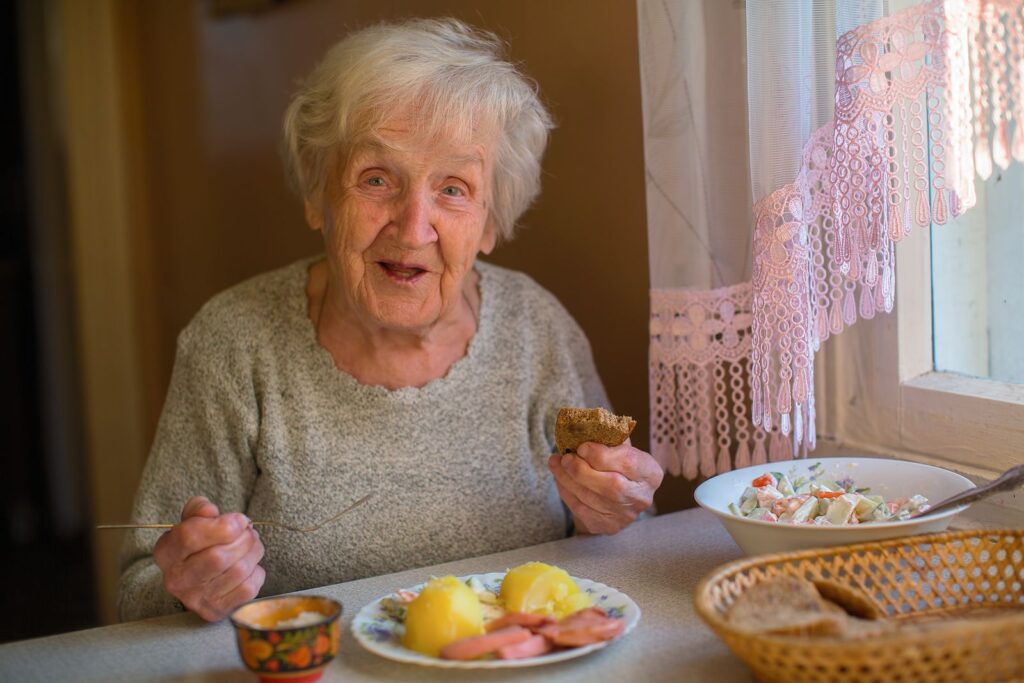
Look Out for Malnutrition as You Age
Malnutrition is one health threat you’ve probably never worried about experiencing personally. You may be surprised, however, to learn that malnutrition is actually a growing problem for older Americans and a danger for many people as they age. In fact, research has shown that many seniors admitted to hospitals in the United States are found to be malnourished.
Proper nutrition is absolutely vital in our later years. Eating a diet that supplies the right nutrients gives us energy, keeps us clear-headed, supports overall health and well-being, and helps strengthen the immune system.
One of the reasons there’s an increased risk for becoming malnourished in later years is because taste buds become less sensitive as we age. Food can start seeming bland and flavorless. In addition, our teeth weaken as we age as do the muscles we use to chew, which makes chewing more difficult. Eating can then become far less enjoyable and turn into more of a chore. As a result, it’s quite easy to start eating less without even realizing it.
Because food can become less flavorful as we get older, we may begin concentrating more effort on finding something to eat that actually “tastes good” and less attention on making sure food is nutritious. In addition, some medications commonly taken in later life are known to reduce hunger dramatically. Malnutrition can also be the result of underlying, undiagnosed medical conditions.
As we get older, it can also become more difficult to prepare meals due to aging-related declines in physical abilities. Some older people, especially those living alone, simply forget to eat. Or they skip meals because they find it tedious to prepare meals for just one person. Others may begin eating less because they’re depressed or grieving.
It’s important to understand that weight is not an accurate gauge of whether or not someone is well nourished. You can be overweight – even obese – and still be malnourished. People with plenty of “meat on their bones” may not be eating the right foods or getting the exercise they need to support their bodies and maintain good health.
Regular medical checkups can identify nutrition-related problems early. When you visit your doctor make sure to bring up the topic of nutrition. He or she will be able to help you make sure you’re consuming a healthy diet and following an exercise plan tailored to your specific needs and abilities.
A few helpful suggestions for avoiding malnutrition…
- Include nutrient-rich foods in every meal and snack.
- Keep healthy, nutritious foods on hand that are convenient and easy to prepare.
- Do not fill up on foods with little or no nutritional value.
- Eat many small nutritious meals and snacks throughout the day instead of the traditional breakfast, lunch and dinner.
- Plan your meals. Don’t wait until you’re hungry. Try not to simply throw meals together without thinking about their nutritional value.
- Cook meals in advance. Store them in your refrigerator or freezer.
- Enhance your typical menu by trying new foods.
- Make mealtime an enjoyable and social experience. Invite family and/or friends to join you.
- Drink plenty of water and eat fruits containing water, such as fruits and vegetables.
- Use fresh herbs and spices to enhance flavor.
- Exercise on a regular basis at a level appropriate to your physical abilities to stimulate your appetite.
SYMPTOMS OF MALNUTRITION
Someone with mild to moderate malnutrition may show few signs of the condition. The following symptoms can be evidence of malnutrition.
- Unplanned weight loss
- Loss of muscle mass
- Loose clothing and/or jewelry
- Loss of appetite
- Lack of energy
- Lethargy/listlessness
- Diminished strength or weakness
- Difficulties chewing/swallowing
- Eyes appearing more sunken
- Dizziness
- More frequent bruising
- Slow healing wounds
- Hair loss
- Confusion/inability to concentrate
- Difficulty managing daily tasks
- Dry, cracked skin
- Brittle fingernails and toenails


Age Adds Flavor
We are not old, we are seasoned!
Don’t forget to visit us on FACEBOOK!
